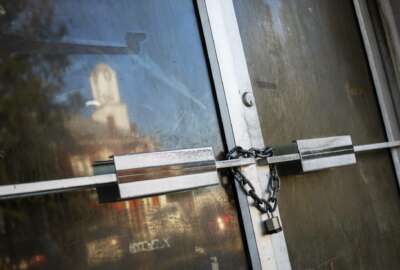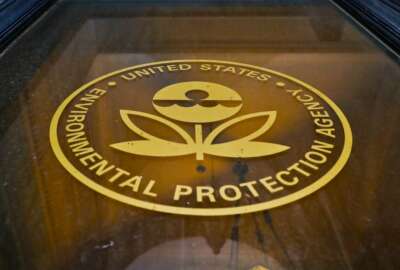GSA updates cleaning standards for federal offices as agencies reopen
GSA is modifying its janitorial services contracts for federally-owned buildings, and will begin issuing unilateral lease amendments on Friday to the owners of more...
As agencies begin sending federal employees back to the office in several states and cities, the General Services Administration is specifying what cleaning and sanitizing federal buildings will need once they reopen.
GSA is modifying its janitorial services contracts for federally-owned buildings, and will begin issuing unilateral lease amendments on Friday to the owners of more than 8,000 federal leased office spaces. GSA has also included the new janitorial language in all new leases.
The updated language requires the lessor to wipe down all high-contact surfaces in common and high-traffic areas at least once a day. GSA will require lessors to clean the surfaces first with soap and water, followed by a disinfectant from a list of EPA-approved products.
Tenant agencies remain responsible for providing employees with disinfectant wipes to clean phones, computers, keyboards, desk lights and other agency-owned property at their workstations.
GSA notified lease acquisition officers, regional leasing offices and its Public Buildings Service regional commissioners about the updated janitorial language in a lease alert on April 30.
GSA has rolled out the standards for cleaning and sanitizing federal offices as multiple agencies – including the IRS, EPA, and Energy, State, Interior departments – have brought employees back into the office, or outlined which staff will return to work under Phase One reopening guidance.
Meanwhile, the Pandemic Response Accountability Committee has found 963 facilities owned or leased by GSA reported positive or presumed cases of coronavirus since May 7.
John Thomas, the acting assistant commissioner of GSA’s Office of Leasing, said the general clauses of GSA’s lease agreements provide the right for the agency to assess the adequacy of any service provided by the building owner.
Read more: Facilities News
Beyond that, Thomas said GSA will work with its facility management staff to ensure that cleaning work meets the standards in the lease amendment.
“It is kind of a difficult thing to address. You see if there’s trash in a wastebasket, if it’s overflowing from the trash basket. For disinfecting, you might look at two services [and] one’s disinfected, the other one’s not, and you might not be able to tell the difference, but certainly, we are working with our facility management employees to address a process for oversight for this,” Thomas said Tuesday in a webinar hosted by the National Federal Development Association.
That oversight will include observations from federal employees at tenant agencies as well as GSA’s lease administration managers who are responsible for the day-to-day lease management and verifying the landlord’s compliance with lease terms and conditions.
To avoid paying for additional cleaning and disinfecting of unoccupied space, GSA will issue these unilateral lease amendments on a phased basis. Thomas said GSA has told tenant agencies to give 14 days advanced notice before returning employees to their office space the agency has enough time to issue the lease amendment and give landlords enough time to adjust their cleaning schedules.
While Thomas said the additional cleaning and disinfecting of space “may become a permanent change to GSA standard of cleaning,” he added that the lease amendment specifying the additional cleaning and disinfecting will not extend beyond the end of September 2021. However, he said GSA could issue another amendment in about a year’s time to extend the additional cleaning and disinfecting beyond that time.
Prior to the amendment, Thomas said GSA leases only required that landlords keep the space clean, but made no mention of disinfecting or sanitizing office space.
Read more: Management News
The unilateral amendment will provide for an increase in the rental payments, but if the landlord requests an “equitable adjustment” beyond the rental increase, Thomas said GSA will negotiate with and reach a bilateral lease agreement with the landlord.
The unilateral amendment also allows GSA to cancel the additional cleaning and disinfecting of space and receive a corresponding rent reduction.
“Ultimately, if a lessor or does not provide a service required by the lease, the government has the option to go and do the service itself and then make any appropriate rental deduction,” Thomas said.
While the new janitorial specifications in the GSA lease template make no specific mention of coronavirus or COVID-19, Thomas said the agency drafted the language so that it could be reused in the event of another public health emergency.
“We were trying to kind of keep it generic, because we knew that, in a year or two, COVID-19 might be over, but there might be another SARS outbreak or there might be another Ebola or some other disease that we’re going to have to face,” he said. “That initially was the thought as to why we did not reference coronavirus or COVID-19 … It was just, ‘We’re trying to write this for a 15-or-20-year period.’”
However, Thomas said the unilateral amendments that GSA will start issuing Friday will specifically mention COVID-19.
GSA has sent out emails to lessors outlining the Centers for Disease Control and Prevention guidelines for the routine cleaning and disinfecting of high traffic and common areas in space leased by GSA. Thomas said most of the lessors that GSA has heard from said they are following the CDC guidelines for cleaning and disinfecting their buildings.
Many state and local governments have recommended or mandated adherence to the CDC guidelines for office buildings and other workplaces.
GSA received $275 million in the CARES Act to deep-clean agency facilities, and Public Buildings Service Commissioner Dan Mathews told Federal News Network in an interview that the agency’s cleaning contracts have a “pandemic clause” that outlines the level of treatment these facilities will undergo.
Mathews said PBS has also worked with the CDC to develop a contract vehicle for agencies seeking enhanced screening for employees, contractors and the public.
Copyright © 2025 Federal News Network. All rights reserved. This website is not intended for users located within the European Economic Area.
Jory Heckman is a reporter at Federal News Network covering U.S. Postal Service, IRS, big data and technology issues.
Follow @jheckmanWFED
Related Stories





